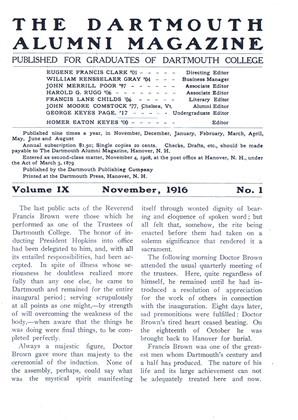This year the annual observance of Dartmouth Night gained special significance from the fact that it occurred on the evening of the inauguration of President Hopkins, and was, therefore, a sort of climax to the events of the two days given up to the inaugural ceremonies and festivities. The presence of a large number of distinguished guests from other institutions as well as of many alumni added to the interest of the occasion. Nevers' Band, a long line of alumni, the entire undergraduate body bearing torchlights, and a kaleidoscopic display of fireworks transformed the college green for the hour before the exercises began into a scene of gayest activity.
Within Webster Hall President Hopkins made his first appearance before tie student body after his inauguration. He recalled in his opening speech previous Dartmouth Nights that he had attended, and emphasized the value of the custom established twenty-one years before. Dean Laycock, as usual, read telegrams from the alumni gatherings all over the country. Prof. E. J. Bartlett in an entertaining address set forth some personal reminiscences, and explained to the freshmen the meaning of the college as an inheritance from its alumni, urging upon them their responsibility for mental and moral preparedness.
For the first time at a Dartmouth ght celebration, the list of speakers contained the name of a non-Dartmouth man, that of President Peirce of Kenyon College. President Peirce brought to the students of Dartmouth greetings from the undergraduates of Kenyon, a college founded in 1828 by Bishop Philander Chase, a graduate "of Dartmouth m the class of 1796. Mr. S. B. Emerson > spoke for the undergraduate body, pointing out to the freshmen that they were on this occasion receiving their first real introduction to the Dartmouth spirit, and discussing the need of college men in the world at large. The original poem of W. D. Quint '87 was received with the greatest of enthusiasm.
President Hopkins in introducing the last speaker, J. P. Richardson '99, made the announcement that the Committee on Education would on the following morning propose to the trustees that Mr. Richardson be elected to the Parker Professorship of Law and Political Science, to fill the vacancy caused by the resignation of Prof. J. F. Colby Mr. Richardson m his speech paid tribute to the services of the three men retiring from the college, and to the character of the incoming president As usual the exercises of the evening closed with the singing of the Dartmouth song.
 View Full Issue
View Full Issue
More From This Issue
-
 Article
ArticleThe last public acts of the Reverend Francis Brown
November 1916 -
 Class Notes
Class NotesCLASS OF 1912
November 1916 By Conrad E. Snow -
 Class Notes
Class NotesCLASS OF 1912
November 1916 By Conrad E. Snow -
 Class Notes
Class NotesCLASS OF 1912
November 1916 By Conrad E. Snow -
 Class Notes
Class NotesCLASS OF 1910
November 1916 By Sturgis Pishon -
 Class Notes
Class NotesCLASS OF 1910
November 1916 By Sturgis Pishon







